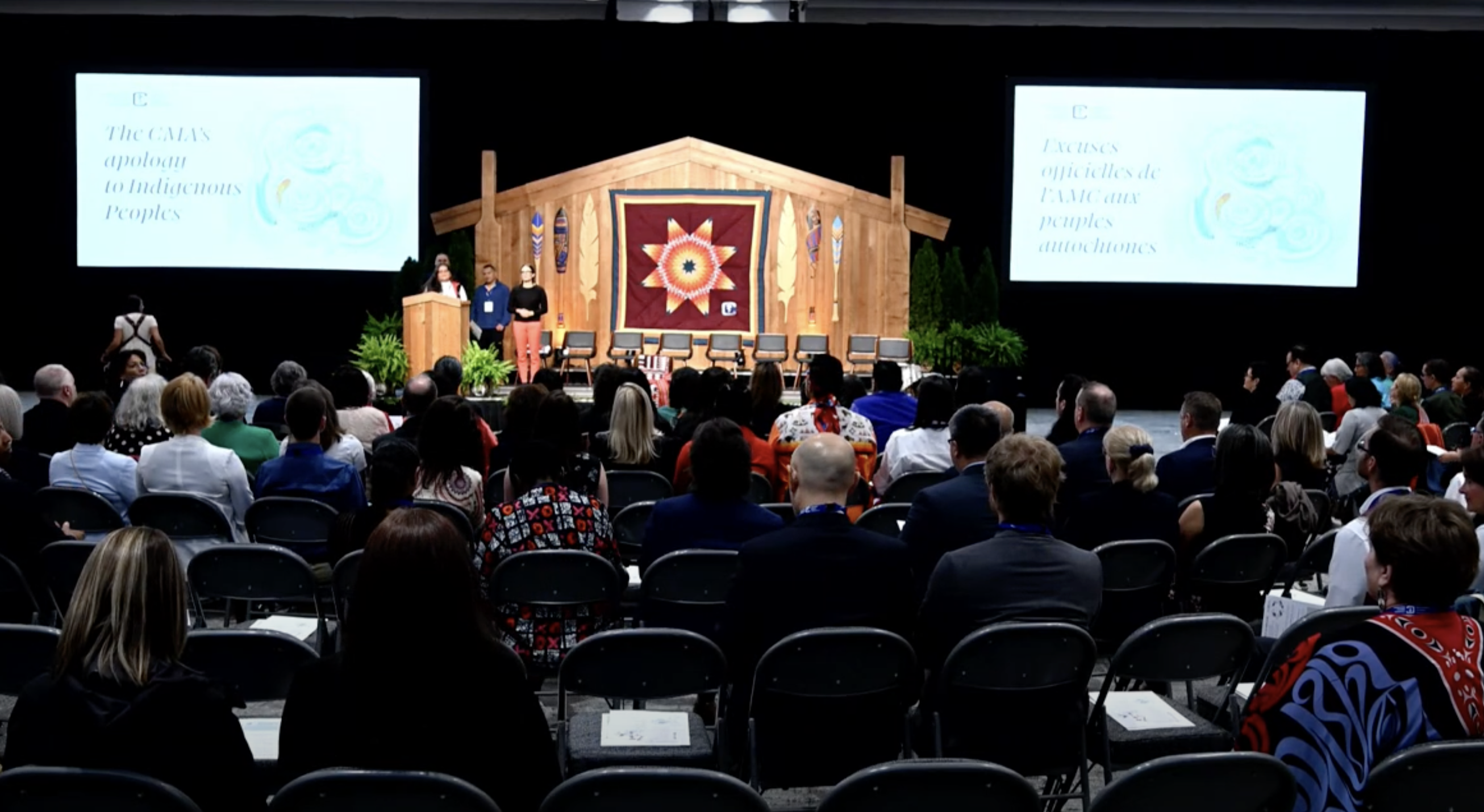
By Native News Online Staff September 20, 2024
The Canadian Medical Association (CMA) apologized for its role and the role of the medical profession in past and ongoing harms to First Nations, Inuit, and Métis Peoples in the health system.
In presenting the apology at a ceremony held on Wednesday, Sept. 18, in Victoria on the ancestral lands of the lək̓ʷəŋiʔnəŋ-speaking people of Songhees and Xwsepsum Nations., CMA President Dr. Joss Reimer spoke of the organization's commitment to being accountable and working together with Indigenous Peoples to do better in the spirit of humility and reciprocity.
“We have not lived up to the ethical standards the medical profession is expected to uphold to ensure the highest standard of care is provided to patients and trust is fostered in physicians, residents and medical students,” she said. “We realize we have left Indigenous Peoples out of that high standard of care.”
The ceremony also included singers, drummers, dancers, musicians and storytellers.
Approximately 225 guests, including local and national Indigenous leaders, members of the CMA Indigenous Guiding Circle and Indigenous Survivors listened as CMA leadership outlined the organization’s path to an apology.
“Today, we turn the first page of a new chapter in the CMA’s history,” said Dr. Alika Lafontaine, CMA president (2022–23). “It's a chapter that we hope First Nations, Inuit and Métis Peoples can write with us together, as we work toward a health system that provides Indigenous Peoples
with the right care, at the right time, in the right place, in a good way.”
That path included an in-depth review of more than 150 years of archives, which revealed the role the CMA, and the medical profession, have played in the mistreatment of Indigenous Peoples, whether through action or inaction. These harms include the devastating impacts of Indian hospitals, forced medical experimentation, forced sterilization, child apprehensions, systemic racism, neglect and abuse within the health care system.
The CMA’s first Indigenous president, Dr. Lafontaine announced the association’s commitment to an apology in June 2023, as an important part of the CMA’s response to the Truth and Reconciliation Commission of Canada’s Calls to Action. With the goal of creating meaningful change in health care and in the relationship between physicians and Indigenous Peoples, the CMA is hoping the apology inspires members of the profession and medical organizations to begin their own reconciliation journeys.
Building on past reconciliation work, the CMA’s ReconciliACTION Plan outlines how it will advance health and well-being for Indigenous Peoples, support the medical profession’s journey toward truth and reconciliation, and promote internal reconciliation as an organization.
The Canadian Medical Association (CMA) apologized for its role and the role of the medical profession in past and ongoing harms to First Nations, Inuit, and Métis Peoples in the health system.
In presenting the apology at a ceremony held on Wednesday, Sept. 18, in Victoria on the ancestral lands of the lək̓ʷəŋiʔnəŋ-speaking people of Songhees and Xwsepsum Nations., CMA President Dr. Joss Reimer spoke of the organization's commitment to being accountable and working together with Indigenous Peoples to do better in the spirit of humility and reciprocity.
“We have not lived up to the ethical standards the medical profession is expected to uphold to ensure the highest standard of care is provided to patients and trust is fostered in physicians, residents and medical students,” she said. “We realize we have left Indigenous Peoples out of that high standard of care.”
The ceremony also included singers, drummers, dancers, musicians and storytellers.
Approximately 225 guests, including local and national Indigenous leaders, members of the CMA Indigenous Guiding Circle and Indigenous Survivors listened as CMA leadership outlined the organization’s path to an apology.
“Today, we turn the first page of a new chapter in the CMA’s history,” said Dr. Alika Lafontaine, CMA president (2022–23). “It's a chapter that we hope First Nations, Inuit and Métis Peoples can write with us together, as we work toward a health system that provides Indigenous Peoples
with the right care, at the right time, in the right place, in a good way.”
That path included an in-depth review of more than 150 years of archives, which revealed the role the CMA, and the medical profession, have played in the mistreatment of Indigenous Peoples, whether through action or inaction. These harms include the devastating impacts of Indian hospitals, forced medical experimentation, forced sterilization, child apprehensions, systemic racism, neglect and abuse within the health care system.
The CMA’s first Indigenous president, Dr. Lafontaine announced the association’s commitment to an apology in June 2023, as an important part of the CMA’s response to the Truth and Reconciliation Commission of Canada’s Calls to Action. With the goal of creating meaningful change in health care and in the relationship between physicians and Indigenous Peoples, the CMA is hoping the apology inspires members of the profession and medical organizations to begin their own reconciliation journeys.
Building on past reconciliation work, the CMA’s ReconciliACTION Plan outlines how it will advance health and well-being for Indigenous Peoples, support the medical profession’s journey toward truth and reconciliation, and promote internal reconciliation as an organization.
No comments:
Post a Comment